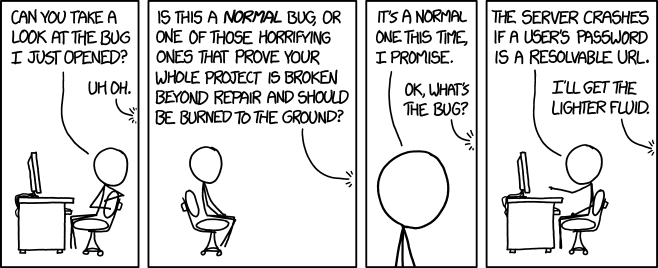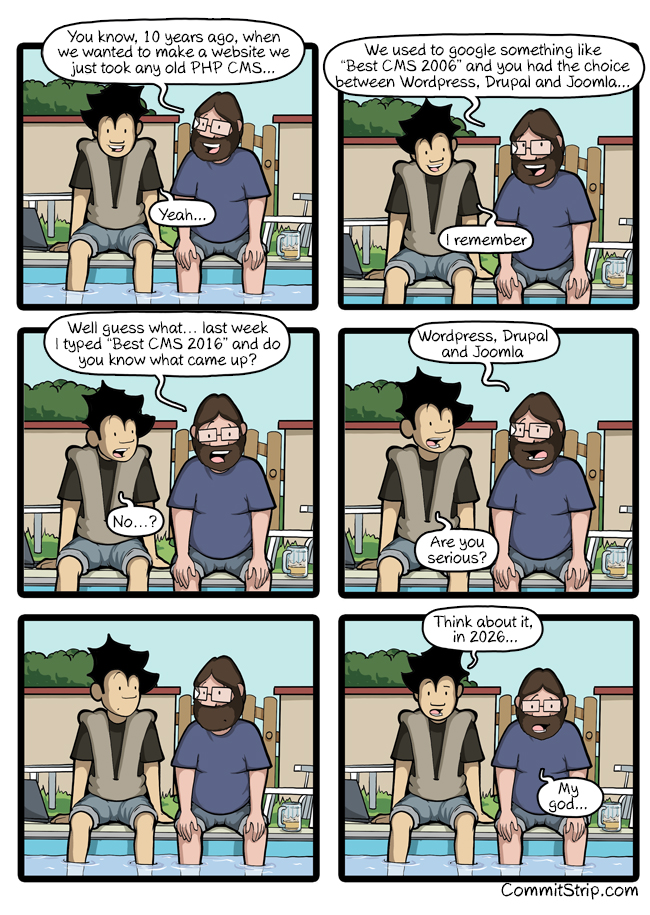Hmm...an entire reimaging of Harry Potter going to Hackwarts would be really cool. Dumbledore, the greatest hacker of the age runs in. Lord Voldemort was his former protege before he went Black Hat. Cornelius Fudge heads 'The Ministry' which polices IT policy throughout the world.
When Harry Potter was born, Voldemort knew he would be trouble. Being the son of the long line of Potter Programmers and then combined with the genius of Lily Evan's flare for SQL insertions, Harry Potter would grow up to the a truly worthy equal. This could not be endured. Harry Potter would need to die.
Using some social engineering, he forced Peter Pettigrew, one of James friends into revealing the admin password for the protections around James home at Godric's Hollow.
Peter Pettigrew was part of a group, alongside James, called the Marauders. They were an elite freelance computing group, renowned in Hackwarts for being able to fix any computing issue one might have. James was an old hand at low level programming having learned from his parents, and could handle anything from FORTRAN, C and a range of others.. His best friend, Sirius Black, came from an old line that used to run Assembly but Sirius had forsaken their ways and learned C and Java instead. Remus Lupin rounded out the team, combining a frightening knowledge of Assembly and back end web development, while Peter took on the front end work.
Armed with the password he got, Lord Voldemort entered the Godric's Hollow server, determined to sabotage some of the electronics that had been gifted to the Potter's for Harry to grow up with. Unknownst to the Black Hat hacker, Lily Evans had just created and installed a brand new firewall and when Voldemort tried to breach it...it broadcast his location to the police. Unfortunately, Lily's new firewall and Voldemort's dreaded 'Avada Kedavra' trojan interacted badly, disabling the hardware safety devices that were hooked to the heating unit and Godric's Hollow burned to the ground, taking James and Lily with it.
For Thirteen years now, Lord Voldemort has been out of sight. Some say he was killed by the police, while others believe that he has been secretly working with the government from a hidden black site.
Amongst the Hackers, Sirius Black, the only survival of the Maruaders, has been a subject of scorn ever since. There were some lines that respectable hackers never crossed, and selling out your friends server password was one of them. Sirius was banished from the world of IT, and sentenced to twelve years at a prison as an accessory of Voldemort's malicious computing group, the 'Death Eater's.
Harry Potter, the most well known hacker, second only to Albus Dumbledore himself, was heralded as 'The Boy Who Codes'. Even as a child he could write simple programs, programs that only seemed to grow in complexity and ambition, and his survival of Lord Voldemort only increased his fame. However, with his parents dead, and Sirius Black disgraced, he was sent to live with Vernon and Petunia Dursley.
Vernon and Petunia didn't hold with this computer business. They were good folk who liked to write things down by hand thank you very much. After the dreadful company Lily Evan's tooko up after she discovered her parents comodore 64, they had no truck with it. Even their spoiled son Dudley, while perfectly happy playing with his playstation wasn't up to messing around with things like operating systems, or graphics cards.
Harry Potter however, was. He was fascinated by computers, from the graphics of the most up to date games, to the hardware...but most of all, Harry Potter loved to tinker with small little programs he would write. He would test them out in the school's computer lab, but spend all day thinking of them.
At first these were nothing more than BATCH scripts. However Harry soon grew passed these simple things and moved on, first to Visual Basic in the computer lab's Excel before moving on to more ambitious and powerful computer's. Harry dreamed of having a computer of his own, but knew that Uncle Vernon would never allow it.
Vernon had a computer, an ancient 486 he had received over ten years ago, that the man used to receive emails from work but even this Vernon only tolerated. Neither Dudley or Harry were permited to work on the machine, and Petunia had no interest. Still, Vernon was known to talk, eagerly, of getting a phone to handle his emails, or even a secretary to handle them for him.
As the weeks lead up to Harry's eleventh birthday, Vernon received an email. It told him his nephew had won an all expense paid scholarship to Hackwerks, the greatest school for IT professionals in the country. Vernon was no fool though, he knew spam when he saw it and deleted it.
When he got up the next morning, the message was back...and another identical one beside that! Snorting to himself at the nerve, Vernon deleted the two messages, and to make sure they couldn't try to get him again, he added the address to the spam filter he ran.
But this didn't seem to work, the next morning, they were back, FOUR of the messages this time! More, his spam filter had shuffled its settlngs and Vernon spent a long two hours trying to retrieve the contents of a email conversation he was having for the company he worked with, Gunnings.
This went on for days, then weeks. Soon his email storage was almost being filled. Every morning he would delete hundreds of the messages. No matter what he did, he couldn't block the sender. Then, to his horror, it got worse. His phone started ringing at all hours of the day, an automated voice reading out the contents of the email.
In despertion, Vernon took his family, fleeing from his house, to a cold shack in the lake. Without his phone, without his email, he could FINALLY get a good nights sleep.
And at twelve midnight, there was a great pounding at the door of the shack.
Grabbing his shotgun, Vernon ran out into the room that his son and nethew were sharing, as the door was thrown open. A truly gigantic man stood there, wearing a black long coat, with a death-metal tee-shirt underneath.
It was Hagrid, keeper of Keyboards and Hardware at Hackwerks.
And Harry Potter's life changed when the large man took him by the shoulder.
"Yer a Hacker, Harry."




















/cdn0.vox-cdn.com/uploads/chorus_asset/file/6518801/Screen%20Shot%202016-05-20%20at%209.35.14%20AM.png)
/cdn0.vox-cdn.com/uploads/chorus_asset/file/6518985/Screen%20Shot%202016-05-20%20at%209.56.15%20AM.png) FDA
FDA